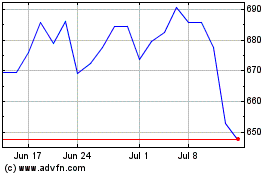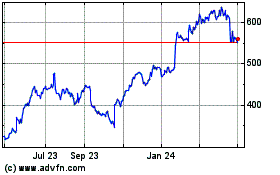FCC's Tom Wheeler Unveils His Plan to Open Up Market for Set-Top Boxes
September 08 2016 - 7:00PM
Dow Jones News
By John D. McKinnon
Federal Communications Commission Chairman Tom Wheeler on
Thursday released his plan to open up the market for television
set-top boxes, setting up a showdown with large cable and other
pay-TV companies.
The FCC is scheduled to vote on Mr. Wheeler's plan on Sept. 29.
Meanwhile, consumer advocates will try to drum up support for it,
while cable and media companies appear likely to try to stop
it.
Mr. Wheeler's plan aims to end the cable industry's powerful
lock on the lucrative market for set-top boxes. The devices have
long been used to fashion cable signals into TV programming, but
more independent suppliers are coming up with new devices that
could offer more, including integrated search of cable
subscriptions and online streaming-video services, including
Netflix and Hulu.
Mr. Wheeler's plan would require cable companies to provide
their subscription feeds free to those device-makers through apps.
Regulators believe the third-party devices could save consumers
money over the cable industry's rented boxes, and FCC officials say
some consumers might even be able to access the cable app through
devices they already own.
The move also could give a boost to Internet-based media,
including small independent producers, FCC officials believe.
It is already "a golden era for watching television and video,"
Mr. Wheeler said in an op-ed article published in the Los Angeles
Times on Thursday. "By empowering consumers to access their content
on their terms, it's about to get cheaper -- and even better."
The plan was scaled back significantly from Mr. Wheeler's
original proposal and borrows heavily from an alternative put
forward by the cable industry.
Still, pay-TV firms, and particularly cable companies, appear
likely to put up a significant fight. Those companies worry that
details of Mr. Wheeler's approach could erode some barriers that
have protected their lucrative business.
One provision, for example, could give the FCC more say over the
exclusive licensing arrangements between cable and media firms by
setting up a new government licensing process for the new apps.
More broadly, some people in the industry fear the potential
added competitive posed by an integrated search system, whether
from independent, user-generated or pirated content.
Cable giant Comcast Corp. on Thursday termed Mr. Wheeler's
proposal "tortured" and "flawed," complaining of its "overly
complicated government licensing regime and heavy-handed
regulation." It also said the proposal exceeds the FCC's
authority.
The FCC said the licensing process would be run by pay-TV
representatives, though the agency said it would retain oversight
to prevent them from setting licensing conditions that are
anticompetitive.
Media companies won some fresh concessions in the plan that
could soften their opposition, such as protections for their own
apps.
Consumer and high-tech groups praised the plan.
Sen. Ed Markey (D., Mass.), a leading critic of the current
arrangement for set-top boxes, said: "Consumers have been waiting
for 20 years for a truly competitive and robust set-top box
marketplace that puts an end to exorbitant cable-box rental fees,
and the FCC's order represents the dawn of a new era."
It has been unclear whether Mr. Wheeler has the necessary three
votes to pass his plan. He is hoping Commissioner Jessica
Rosenworcel will end up supporting the proposal, despite bipartisan
opposition to it in Congress at a time when her own renomination is
pending.
Write to John D. McKinnon at john.mckinnon@wsj.com
(END) Dow Jones Newswires
September 08, 2016 18:45 ET (22:45 GMT)
Copyright (c) 2016 Dow Jones & Company, Inc.
Netflix (NASDAQ:NFLX)
Historical Stock Chart
From Mar 2024 to Apr 2024

Netflix (NASDAQ:NFLX)
Historical Stock Chart
From Apr 2023 to Apr 2024
